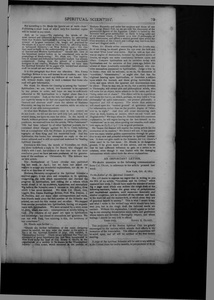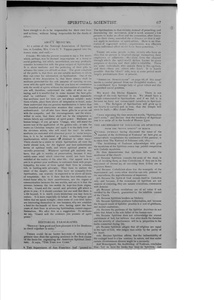<Untitled> (By all the doubts and trials that so vex us)
By all the doubts and trials that so vex us, |
< Plain Statements and Explanations (continued from page 3-170) >
Blavatsky, we beg the favor of our readers, while we refer to several of our able correspondents.
At what date Madame Blavatsky came to this country we do not know; we did not see her until July last, and then but several times, nor have we seen her since. In the month of March, without previous acquaintance or preliminary correspondence, we received from her the article, “Who Fabricates?” This had been refused by all other Spiritual journals, for it contained direct charges against Dr. H. G. Child, indicting him as a conspirator with the Holmes in producing the photographs of Katy King and his wonderful book. And this Spiritualist, this leader, has attempted no reply to the evidence adduced, and is still accepted and endorsed by “leading Spiritual journals.”
Previous to this time, the month of November, we think, she alone undertook a reply to Dr. Beard, who charged the Eddy’s with fraud; her evidence at that time was the most conclusive proof we have yet seen produced, of the genuineness of the mediums at Chittenden, Vt. The defence was an able article.
The Brotherhood of Luxor circular was published; the last week in April; but we have not asked our readers to accept any wonderful explanations, nor do we intend to at this time of writing.
Madame Blavatsky recognized in the Spiritual Scientist a spiritual paper; it was plain and outspoken in its opinions, recognizing the evils which encumbered and checked the progress of Spiritualism, and calling for a reform which would divest it of its tricksters, hypocrites, and sensualists. We believe the Scientist owes it success to this policy, from which it has never deviated. We think Col. Olcott, Gen Lippitt, Mrs. Emma Hardinge Britten, Prof. Wm. Denton, J. M. Peebles, and our many other correspondents and warm, firm friends made since the first number of the Scientist was printed, are such for this reason and no other. We stepped from secular journalism into Spiritualism, having no acquaintance with Spiritualists. We were actuated by a stern sense of duty, which was ours: consequences or results belong to God. The columns of our paper are open to Spiritualism and knowledge; but closed to sensualism and ignorance. We can say with Paul, “our rejoicing is this, the testimony of our conscience.”
Dr. Bloede says further:—
“Should any further indications of the same designing power be needed, we may refer the reader to the article in No. 2 of the Spiritual Scientist of Sept. 16th entitled, ‘A Theosophical Society.’ There we are informed that ‘One (sic) movement of great importance has just been inaugurated in New York under the lead of Col. Henry S. Olcott, in the organization of a society to be known as the ‘Theosophical Society.’ This event, which occurred in the parlors of Madame Blavatsky and under her auspices and those of one M r. George Henry Felt, (as we are told ‘the discoverer of the geometrical figures of the Egyptian Cabala’) is hailed by the Scientist ‘with great satisfaction’ as likely to bring order out of our present chaos, (?) furnish cs a true (?) philosophy of spirit intercourse, and afford a neutral ground upon which the tried wrestlers of the Church and College may rest from their cruel and illogical strife. (!!!)”
When Dr. Bloede writes concerning what the Jesuits may do or are doing, he should glance his eye over the field and see what “Free Love” Has Done. Had he told us that this was an engine of destruction, invented by departed spirits of Jesuits, we might see some consistency between cause and effect. Compare Spiritualism and its societies to-day with Spiritualism and its societies of four years ago, before the advent of these jesuitically controlled individuals who consider sensualism paramount to Spiritualism. Judge a tree by its fruits; then will he welcome, as we do, the discussion of “occultism,” “elementaries,” or aught else that has the slightest bearing upon Spiritualism, or furnishes a subject upon which the learned, and those giving instruction can write, and upon which the ignorant and monomaniacs must be silent. Then he may see, as we do, that a society devoted to Theosophy, will attract able and philosophical minds, who will unite for an object, incite others to do the same, and thus “bring order out of chaos.” The object will be to experiment and study for Facts, on which, perhaps, we may build a “true philosophy” of spirit intercourse; our present philosophy is imperfect and full of mystery. The minds thus attracted will stand upon the “neutral ground” of ignorance seeking for information, rather than on the positive dogma of “what, ever is, is right” And they will cease denouncing each other as fools, knaves, or Jesuits, which we call “cruel and illogical strife.” We hope when Dr. Bloede reads this courteous explanation, he will regret having so far lent himself to the “mysterious” as to use, when quoting our remarks, such cabalistic signs, as (?), (?), (!!), (!!!) in so great profusion.
He “hopes the Banner will reprint the entire article for the instruction of its readers.” We think it will not. It has passed over too many similar golden opportunities through its prejudice to any new and powerful enterprise in Spiritual journalism. It does not give credit to the Scientist, for Col. Olcott» letter used in its last issue. Dr. Bloede is on dangerous ground, if he gives much of this advice, and we wonder that he had sufficient influence to gain us a notice in its columns, even though it was loaded with the damaging insinuations which called forth the above explanations.
An Important Letter
We desire attention to the following communication from Col. Olcott, in reference to his article printed last week.
New York, Oct. 18, 1875.
To the Editor of the Spiritual Scientist:
Sir:—I desire to express my regret that in writing to you the MS. of my article, “Occultism and its Critics,” which appeared last week, I should have made the mistake of including a page upon which was written the rough draft of the following sentence, “when the great army of perspirational and inspirational speakers, with numerous honorable and evident exceptions, will be crowded off the rostrum and back to the wash-tub and the manure-fork, at which alone they are of practical benefit to society.” This is what I meant to say, and what I wrote in the revised copy which should have been sent you, but in the rough draft the italicized words are omitted. Without this explanation, I would appear as including in one sweeping denunciation many ladies and gentlemen whose talents and devotion I thoroughly respect, and whose feelings I should be very loth to offend.
Yours truly,
The Archbishop of Toulouse on Spiritism
Several journals having discussed the tenor of the U mandate of the Archbishop of Toulouse’ we here give an extract which recapitulates the sentiments of this pastoral; it is taken from The National of February loth, 1875: —
“The Archbishop of Toulouse acknowledges with grief the mysticism of the Spiritists comes into painful competition with Catholic mysticism.
He then demonstrates that Spiritism falls under the anathemas of the church:
1st. Because Spiritism consults the souls of the dead, in lieu of invoking them, as does Catholicism, if they are in the enjoyment of eternal joy, of succoring them if they are in expiatory flames.
2nd. Because Catholicism alone has the monopoly of the supernatural; and every other doctrine can only pretend to the marvellous, the marvellousness of imposture.
3rd. Because the Spirit of God reveals itself to Catholics only: and because, if the evocations of Spiritism are not seances of conjuring, they are satanic evocations, communion with demons.
4th. Because private revelations are of no value if not certified by the Church, guaranteed by the infallible control of the Church.
5th. Because Spiritism borders on Idolatry.
6th. Because Spiritism produces hallucination, and because the frequent result of Spiritist practice is a sort of giddiness, and mental exaltations.
7th. Because the partisans of the Spiritist doctrines do not admit that Adam is the sole father of the human race.
8th. Because Spiritism does not acknowledge the eternal punishment of hell, but believes that after death the duration and the severity of chastisement will be in proportion to the faults committed during life.
9th. Because Spiritism alleges that all religions are equal in the sight of God, who judges man solely by the purity of his heart.
10th. Because Spiritism affirms that the indissolubility of the conjugal bond is a law contrary to nature, and that under certain circumstances divorce might be a necessity.
And Monseigneur, the Archbishop of Toulouse, concludes thus: ‘Let us burn the books that treat on Spiritism. Let us never listen, on subjects of faith, to the voice of any other society thar the Church.’ ”—
Editor's notes
- ↑ By all the doubts and trials that so vex us by unknown author
- ↑ An Important Letter by Olcott, H. S., Spiritual Scientist, v. 3, No. 7, October 21, 1875, p. 79
- ↑ The Archbishop of Toulouse on Spiritism by unknown author, Spiritual Scientist, v. 2, No. 6, April 15, 1875, p. 67. From the "Revue Spirite" of March
Sources
-
Spiritual Scientist, v. 3, No. 7, October 21, 1875, p. 79
-
Spiritual Scientist, v. 2, No. 6, April 15, 1875, p. 67


